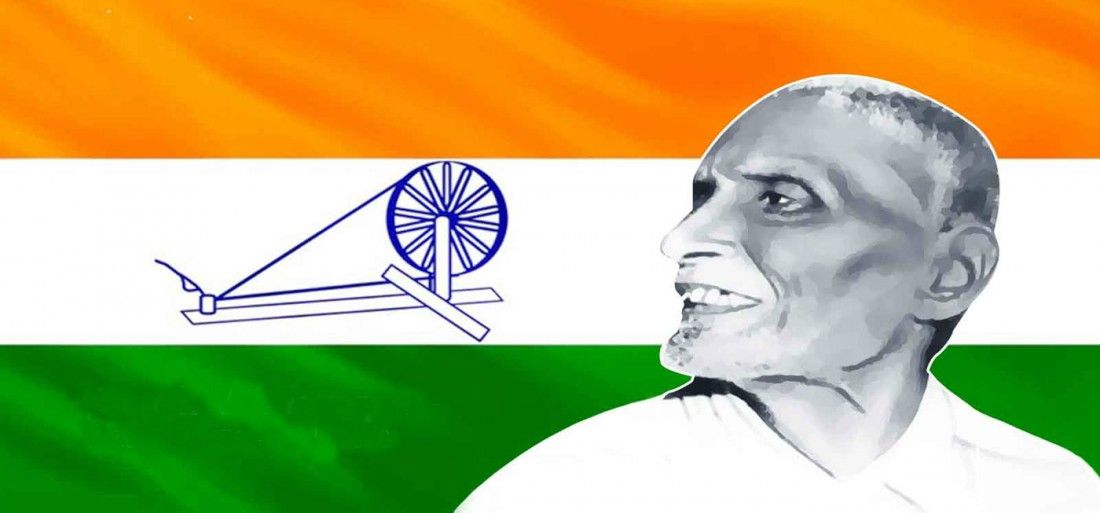


Pingali Venkayya, a legendary freedom fighter from Andhra Pradesh, is the designer of India's national flag. He lived for his Gandhian ideals and was associated with Mahatma Gandhi for most of his life. Despite facing poverty and obscurity, Venkayya's contributions to India's independence were finally recognized through postage stamps and a statue. And now, Andhra Pradesh's Chief Minister is pushing for the highest civilian award, the Bharat Ratna, to be bestowed upon the unsung hero.
Unsung Hero: Pingali Venkayya, the Designer of India's Tricolor
Pingali Venkayya, a remarkable freedom fighter from Andhra Pradesh, was the visionary behind the design of India's iconic national flag. His unwavering dedication to his Gandhian ideals and close association with Mahatma Gandhi have left an indelible mark on India's history.
Early Life and Activism
Born in 1876 into a poor farming family in Machilipatnam, Andhra Pradesh, Pingali Venkayya displayed a keen interest in the Indian independence movement from a young age. He joined the Indian National Congress in 1906 and actively participated in non-violent protests. Inspired by Mahatma Gandhi's teachings, Venkayya became a staunch advocate of spinning khadi and self-reliance.
Designing the National Flag
Venkayya's most significant contribution came in 1921 when he proposed a design for the Indian national flag to the Indian National Congress. His design consisted of three horizontal stripes of green, white, and red, representing the country's different religions, communities, and sacrifices. A spinning wheel, representing self-reliance, was placed in the center of the white stripe.
Despite undergoing several modifications, Venkayya's basic design was adopted as India's official flag on July 22, 1947, just days before the country gained independence.
Struggle and Recognition
Throughout his life, Venkayya faced poverty and obscurity. His contributions to the independence movement went largely unrecognized for many years. However, in 1963, the Indian government honored him with the Padma Bhushan, the third highest civilian award.
Current Recognition
In recent years, there has been a renewed push to recognize Pingali Venkayya's extraordinary contribution. The Andhra Pradesh government has been actively advocating for the Bharat Ratna, the highest civilian award, to be bestowed upon Venkayya.
Top 5 FAQs
1. Who was the designer of the Indian national flag? A. Pingali Venkayya
2. What was the significance of the colors in Venkayya's design? A. Green: Prosperity; White: Peace; Red: Courage
3. When was Venkayya honored with the Padma Bhushan? A. 1963
4. What is the current status of the Bharat Ratna nomination for Venkayya? A. Under consideration
5. What is Pingali Venkayya's legacy? A. He is remembered as a tireless freedom fighter and the visionary behind the design of India's national flag.

Prime Minister Narendra Modi celebrates Diwali with Navy personnel aboard INS Vikrant, praising the warship's role in instilling fear in Pakistan. He commemorates India's military might and the bravery of armed forces in Operation Sindoor, while also highlighting INS Vikrant as a symbol of Atmanirbhar Bharat and Made in India. The festive celebrations on board consisted of cultural performances and an air power demonstration, making the occasion deeply symbolic and unforgettable.

Prime Minister Narendra Modi celebrated Diwali with the crew of India's indigenous aircraft carrier INS Vikrant, describing the ship as a symbol of Aatmanirbhar Bharat and Made in India. He saluted the Indian Navy, Air Force, and Army for their courage, skill, and coordination, especially during the 1971 victory over Pakistan. The Prime Minister also highlighted the progress towards self-reliance in India's defence production, with thousands of items now being manufactured domestically and a new indigenous warship or submarine being inducted into the Navy every 40 days on average.

On October 21, Defence Minister Rajnath Singh will honor the sacrifices made by police personnel at the National Police Memorial on Police Commemoration Day. The Memorial serves as a symbol of the strength and selflessness of police officers who have laid down their lives in the line of duty. The central sculpture, 'Wall of Valour', and museum at the Memorial provide a sense of national identity and pride for Police Forces.

Prime Minister Narendra Modi made a surprise visit to INS Vikrant, India's flagship aircraft carrier, on Diwali eve 2025. This marked his first visit to the high seas to celebrate with the Navy personnel stationed there. His visit included cultural activities, a yoga session, and an inspiring address to the naval staff, further strengthening the bond between the leader and the armed forces.

Prime Minister Narendra Modi celebrated Diwali with the Indian Navy on the INS Vikrant aircraft carrier stationed off the coast of Goa and Karwar. The cultural programme organized by the Navy was described by PM Modi as an unforgettable experience. He also praised the dedication and creativity of the naval personnel and highlighted the success of the armed forces in Operation Sindoor with a patriotic song "The Vow of Sindoor". In addition, PM Modi also addressed the country's security forces and lauded their efforts in combating Naxalism.

In a powerful Diwali speech on board INS Vikrant, Prime Minister Narendra Modi lauded the coordination of India's armed forces in Operation Sindoor, which led to a swift surrender by Pakistan. He also emphasized the importance of self-reliance in strengthening the armed forces and highlighted India's progress in manufacturing essential military equipment domestically. He further announced India's goal to become a top defence exporter, with a significant increase in defence exports in the last decade.

Prime Minister Narendra Modi continued his tradition of celebrating Diwali with India's armed forces by visiting the INS Vikrant off the coast of Goa and Karwar. He praised the Navy personnel for their dedication towards the security of the nation and expressed his gratitude to the families of the brave soldiers. PM Modi also witnessed an impressive display of precision and prowess during an Air Power Demo on INS Vikrant, showcasing the technological excellence of the Indian Navy.

Prime Minister Narendra Modi celebrated Diwali 2025 with Indian Navy personnel aboard the indigenous aircraft carrier INS Vikrant, highlighting the ship's strength and psychological impact on adversaries. Commissioned in 2022, the carrier is a symbol of India's self-reliance and strategic resolve. PM Modi praised the bravery and dedication of the naval personnel, reinforcing the bond between the armed forces and the government.

The Allahabad High Court has directed the Jailer of Hisar Central Jail in Haryana to provide an explanation on how self-styled Godman Sant Rampal, currently held in the jail, is able to write and distribute books that allegedly target Hindu deities. This comes after a plea was filed by Hindu Front for Justice, calling for a ban on the books and action against Rampal. The petition alleges that the books contain offensive and provocative language and have been distributed through electronic communication platforms, causing disharmony between religious communities.

Following the latest string of scandals involving Prince Andrew, King Charles was photographed attending a Sunday morning service near his Scottish estate. The King wore a solemn expression as he drove to Crathie Kirk, displaying tension amidst a tumultuous time for the royal family. Recently, Prince Andrew announced his resignation from the Duke of York and membership of the Order of the Garter, the oldest chivalric order in the UK.